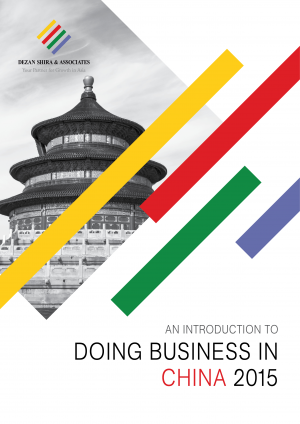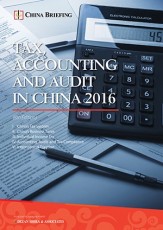Making the Cut: New Measures to Qualify as a High-tech Enterprise in China
Editor: Jake Liddle
China’s Ministry of Science & Technology, Ministry of Finance and State Administration of Taxation have jointly revised and improved the “Measures for Administration of Accreditation of High-Tech Enterprises (Guo Ke Fa Huo [2016] No.32).” The new rules were issued for implementation on January 1 this year, repealing the former Measures (Guo Ke Fa Huo [2008] No.172). Major adjustments include changing requirements for the amount of technical staff employed and total income thresholds.
After recognition, the status certificate will be valid for three years after the issue date, affording the enterprise with tax incentives such as a reduced 15 percent corporate income tax (CIT) and staff training reimbursements. The updated requirements and qualifications for a high-tech enterprise, as well as the application material required, can be found below.
![]() RELATED: Business Advisory Services from Dezan Shira & Associates
RELATED: Business Advisory Services from Dezan Shira & Associates
Status Eligibility and Requirements
Enterprises seeking to obtain high-tech enterprise status must meet the following criteria:
- Be a fully or partly foreign owned company registered within the People’s Republic of China, not including the regions of Hong Kong, Macau or Taiwan;
- Be operating within the specified fields stated in the “high-tech fields supported by the state;”
- Implement continued research and development and technological achievements;
- Have acquired the intellectual property rights that technically support their main products (services) by means of independent R&D or purchasing and transferring;
- Have been established for a year or more;
- The technical personnel of enterprises engaged in research and development and related technological innovation activities account for no less than 10 percent of the total number of employees in that year;
- In the last three financial years, R&D expenditure accounts for sales income adhere to one of the following:
- In the last year, total income is not less than five percent if latest annual sales income is less than RMB 50 million;
- Not below four percent if the latest annual sales income is between RMB 50 million and RMB 200 million; and
- Not below three percent if the latest annual sales income is upwards of RMB 200 million.
- R&D expenditure within China is not less than 60 percent;
- The ratio of income from high-tech related operations against total income is not lower than 60 percent.
Application Material
The following is a list of relevant material to be submitted along with a high-tech enterprise status application:
- Relevant registration documents proving legal business establishment;
- IP-related materials, scientific research project certification, scientific and technological achievements, the organization and management of research and development and other related materials;
- Product/services technical specifications, production approval, certification and accreditation and related qualification certificates, product quality inspection report and other related materials;
- For enterprises with qualifications issued by agents, R&D expenses from the last three fiscal years, revenue audit reports or attestation report of new technology products or services from the last fiscal year, accompanied by explanatory materials research and development activities pertaining to R&D activities are also required;
- For enterprises with appraisal of qualified agents, financial account reports from the last three fiscal years, including financial statements, accounting statements and financial situation, are required;
- Annual CIT return certificate.
Supervision and Terms of Violation
The Ministry of Science and Technology, Ministry of Finance and State Administration of Taxation are held responsible for the supervision following accreditation of high-tech enterprise status.
Authorities who discover enterprises which do not meet specified conditions will invite certified organizations to conduct a review. If the enterprise is found to not comply with the conditions, high-tech enterprise status will be withdrawn, and tax authorities will be notified.
Key Takeaways
It is important for an enterprise interested in obtaining high-tech status to be aware of the revised requirements and application procedure. With significant tax incentives provided for enterprises with the qualification, China’s government is accordingly stringent in its regulation and inspection of companies applying for the benefits.
|
Asia Briefing Ltd. is a subsidiary of Dezan Shira & Associates. Dezan Shira is a specialist foreign direct investment practice, providing corporate establishment, business advisory, tax advisory and compliance, accounting, payroll, due diligence and financial review services to multinationals investing in China, Hong Kong, India, Vietnam, Singapore and the rest of ASEAN. For further information, please email china@dezshira.com or visit www.dezshira.com. Stay up to date with the latest business and investment trends in Asia by subscribing to our complimentary update service featuring news, commentary and regulatory insight. |
![]()
 An Introduction to Doing Business in China 2015
An Introduction to Doing Business in China 2015
Doing Business in China 2015 is designed to introduce the fundamentals of investing in China. Compiled by the professionals at Dezan Shira & Associates, this comprehensive guide is ideal not only for businesses looking to enter the Chinese market, but also for companies that already have a presence here and want to keep up-to-date with the most recent and relevant policy changes.
 Employing Foreign Nationals in China
Employing Foreign Nationals in China
In this issue of China Briefing, we have set out to produce a guide to employing foreign nationals in China, from the initial step of applying for work visas, to more advanced subjects such as determining IIT liability and optimizing employee income packages for tax efficiency. Lastly, recognizing that few foreigners immigrate to China on a permanent basis, we provide an overview of methods for remitting RMB abroad.
 Tax, Accounting, and Audit in China 2016
Tax, Accounting, and Audit in China 2016
This edition of Tax, Accounting, and Audit in China, updated for 2016, offers a comprehensive overview of the major taxes that foreign investors are likely to encounter when establishing or operating a business in China, as well as other tax-relevant obligations. This concise, detailed, yet pragmatic guide is ideal for CFOs, compliance officers and heads of accounting who must navigate the complex tax and accounting landscape in China in order to effectively manage and strategically plan their China-based operations.
- Previous Article China Regulatory Brief: Foreign-invested Projects Management in Zhejiang, Criteria for Qualified High-tech Enterprises
- Next Article Navigating China’s FTZs: Market Access, Tax Systems and Registration Procedures, Part 2



























